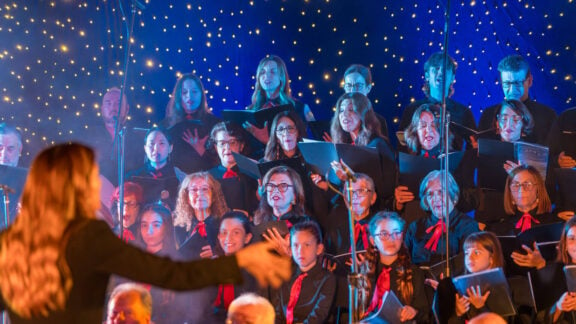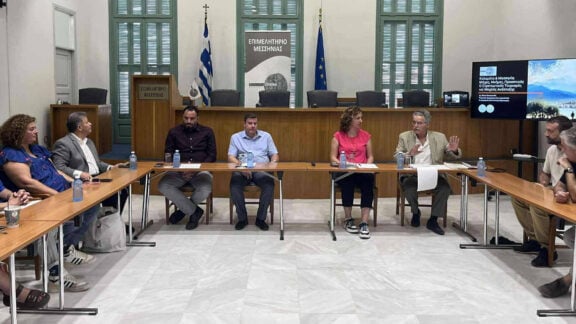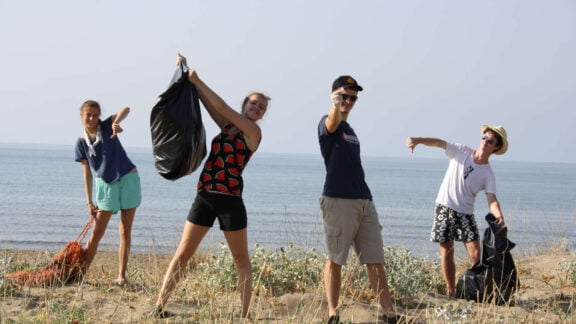Dr. Leon Saltiel, a Thessaloniki-born historian and expert on the Holocaust in Greece, presented at Melbourne’s Holocaust Museum on April 24. He discussed his award-winning books, “The Holocaust in: Reactions to the Anti-Jewish Persecution, 1942–1943,” and “Do Not Forget Me: Three Jewish Mothers Write to their Sons from the Thessaloniki Ghetto.”
Dr. Saltiel holds a PhD from the University of Macedonia and has completed post-doctoral studies in Greece and Switzerland. He is a member of the Central Board of Jewish Communities of Greece and the Greek delegation to the International Holocaust Remembrance Alliance. He is now stationed in Geneva and holds various international post all aimed at combating anti-Semitism.
On the invitation of the Consul-General of Greece in Sydney, Ioannis Mallikourtis, Dr. Saltiel delivered a talk on the commemoration of the 80th anniversary of the deportation of Thessaloniki’s Jews by the occupying Nazi Germans on April 20. The Greek Archdiocese of Australia also supported the event, with Archbishop Makarios of Australia in attendance. The talk was hosted by the University of Sydney’s Australian Archaeological Institute at Athens and the University of Sydney. Dr. Saltiel presented again at Melbourne’s Holocaust Museum four days later.
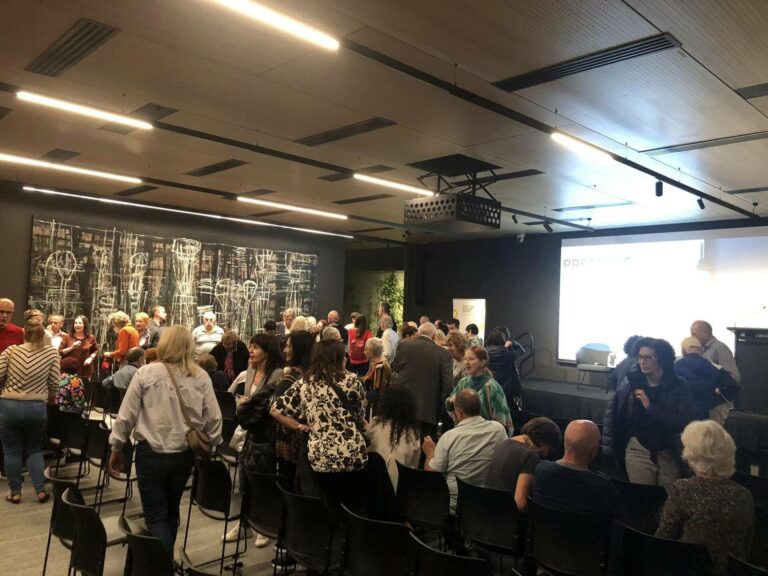
Greece’s Jewish History
In Melbourne Dr Saltiel reflected on the Jewish presence in Greece – especially his own Thessaloniki – the Holocaust in Greece; the post-war Greek-Jewish experience, and contemporary developments in building awareness of the Holocaust and countering antisemitism in Greece.
He talked about the 2,000-year Jewish presence in Greece, referencing the Apostle Paul’s meeting with local Jewish communities as he traveled across Greece. This original Greek Jewish [Romaniot] community was augmented by the arrival of Sephardic Jews expelled during Spain’s Inquisition during the 15th century and invited by the Ottoman Empire to settle in its realm. Many thousands made their home in Thessaloniki, creating a large and vibrant Jewish community that constituted the majority of its citizens when the city was incorporated into Greece in 1912.
Dr Saltiel highlighted the services of Greek Jews in the defense of Greece, with some 10,000 serving on the Albanian front against Mussolini’s Italian invaders in 1940, including the heroic Colonel Mordechai Frizi from Evia who died in battle there. Colonel Frizi had previously served on the Salonika Front in the First World War and in Asia Minor during the Greco-Turkish War. Many Greek Jews in World War Two also went on to serve with the resistance to the subsequent Axis occupation.

This large and vibrant community suffered the depravations of the occupation with their fellow Greek Christians but were additionally subjected to the Nazis’ racial anti-Semitism and were sent to the death camps, which define the Holocaust. The historian said an estimated 67,000, over 90 percent of the pre-war Greek Jewish community, were murdered by the Nazis. The extent of this destruction was one of the most extensive of any Jewish community in Europe. The German occupation also witnessed the destruction of Thessaloniki’s Jewish Cemetery – then the largest in Europe – by the local city authorities acting with German approval.Dr Saltiel outlined aspects of the post-war experience of the few Greek Jews who survived. They returned to find most of their loved ones gone, their homes and belongings confiscated and appropriated by others.
Post-war Greek authorities failed to give effect to their restitution legislation, with a very small and inadequate proportion returned to either their former owners or the community as the new law required. The prosecution of war criminals was limited, the celebrated case of the former senior German occupation official Max Merten who was arrested in 1957, convicted and then almost immediately released by the Greek authorities. The Greek Government subsequently committed to hold no further war criminal prosecutions.

Facing the Future, Confronting the Past
The main feature of Dr Saltiel’s address was one of optimism for the future, he brought our attention to positive actions taken by Greek authorities to both remember the Holocaust in Greece and combat antisemitism.
The historian pointed out that until the 1990s, the commemoration of the Holocaust in Greece was undertaken only by its surviving Jewish community, not the wider Greek community. However, since then, greater efforts have been made to commemorate the horror visited on the Greek Jewish community and to confront anti-Semitism.
He spoke of the former Mayor of Thessaloniki, Yiannis Boutaris and his symbolic wearing of the Star of David, the creation of the new memorial to the destruction of Thessaloniki’s Jewish cemetery in the grounds of Thessaloniki’s Aristotle University and the honourary membership of the Greek Orthodox Patriarch of Greece’s Jewish community.

Dr Saltiel hailed attempts to address the story of Greece’s part in the Holocaust in Greece, at governmental and civil society levels, like new laws pertaining to hate speech and Holocaust denial’ and the commitment to establish a major new Holocaust museum in Thessaloniki. The Greek authorities’ firm response to the rise of the extreme Nazi aligned, Golden Dawn party, was evidence of the need to confront anti-Semitism and Holocaust denial.
Commemorations and marches are now held across Greece on International Holocaust Remembrance Day, January 27th, with banners and illuminations featuring the words “We Remember” prominently projected onto Thessaloniki’s famous White Tower. The occasion is also a moment for discussion on the need for social harmony and opposition to racism and anti-Semitism. During his presentation, Dr. Saltiel showed a photograph of a recent Holocaust march held in Thessaloniki, attended by thousands and led by many community and political leaders, including the President of the Hellenic Republic, Katerina Sakellaropoulou.

One of the most moving aspects of the presentation was a short excerpt from a video that drew on material from Dr. Saltiel’s book “Do Not Forget Me.” In the video, the Hellenic President read from a mother’s letter to her child as she languished in the ghetto established by the Nazis in Thessaloniki.
Dr. Saltiel’s presentation was followed by many questions from the audience, including members of Melbourne’s Greek Community who had joined with Melbourne’s Jewish community for the event. Nick Dallas and my partner, Vicki Kyritsis, both members of the Greek Community of Melbourne, Victoria board, were there. Vicki also has a family connection to the Saltiel family. Meeting Dr. Saltiel, a renowned expert in his field, was a great honour. And on behalf of our committee, I presented him with a copy of my book ‘Lemnos & Gallipoli Revealed.’ Congratulations to all those involved in organizing this important event.
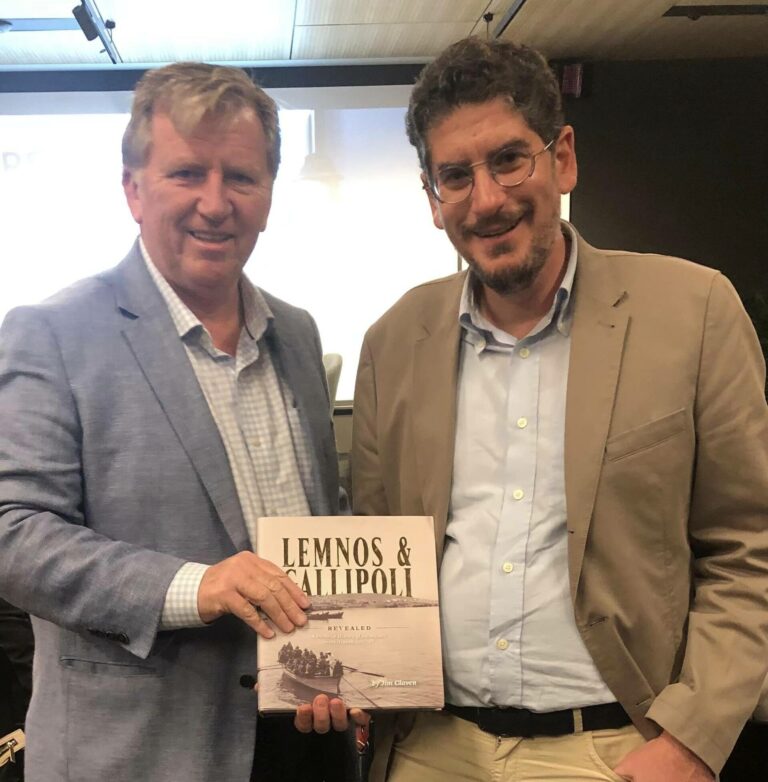
We Remember – in Thessaloniki’s Sister City
Dr Saltiel’s visit to Melbourne prompts reflection on a new beginning in Greek-Jewish-Australian relations. Racism and anti-Semitism are viruses which if not confronted can lead to horrors like the Holocaust. Melbourne is home two major diasporas, the Hellenic and Jewish, the was until recently a home for the largest number of many Holocaust survivors, many of whom like the post-war Greek immigranst have passed away, however their descendants are with us. As Sister Cities, Melbourne and Thessaloniki could enhance community relations through an annual joint commemoration of the Holocaust on January 27th and Hellenic leaders could come together under the theme “We Remember” with commemorative services, presentations, and educational events at community-connected institutions.
Organising this for next year would be a great start. Showing Dr Saltiel’s documentary on the Greek Holocaust would also be amazing. Let us remember and mark the suffering of our fellow Greek Jews. As they say in Greece, “We Remember.”
Jim Claven is a historian, freelance writer and published author, his most recent works including Lemnos & Gallipoli Revealed: A Pictorial History of the Anzacs in the Aegean (2019) and Grecian Adventure: Greece 1941, Anzac Trail Stories & Photographs (2022). He reviewed the book The Holocaust in Greece edited by Assistant Professor Giorgos Antoniou and Professor Dirk Moses, for Neos Kosmos in 2020. He can be contacted via email – jimclaven@yahoo.com.au



